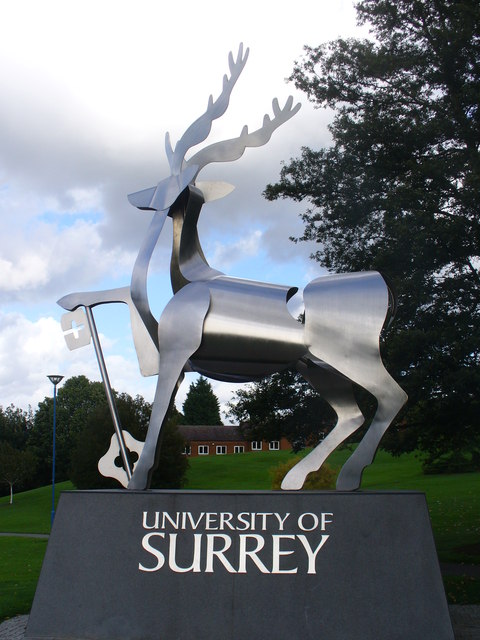 Abraham Lincoln
If given the truth, the people can be depended upon to meet any national crisis...
Abraham Lincoln
If given the truth, the people can be depended upon to meet any national crisis...
 Guildford news...
for Guildford people, brought to you by Guildford reporters - Guildford's own news service
Guildford news...
for Guildford people, brought to you by Guildford reporters - Guildford's own news service
Students Reveal Why They Have Chosen Nursing As A Career
Published on: 2 Mar, 2021
Updated on: 3 Mar, 2021
Grace Eakin is an undergraduate studying for a degree in philosophy at the University of Reading, who also has links with Guildford. Here she speaks to five student nurses from the University of Surrey about their studies during the pandemic and why they have chosen nursing as a career.
This summer a new cohort of nurses will qualify and head out into the workforce. They begin their careers at an unprecedented time.
In Guildford, student nurses of the University of Surrey will do the same, taking their places on the front line at the time of the pandemic.
What is it like to train as a student nurse? How has the pandemic shaped them in their vocations? I spoke to five student nurses from the University of Surrey about their experiences.

Annie Durham.
Annie Durham, a child nurse graduating from Surrey this summer says that growing up she constantly changed her mind about her career path.
However, it became clear to her that in choosing a profession that utilises her gifts and talents, she was not likely to go far wrong.
It was nursing that fit these criteria. In fact, all five nurses interviewed gave a strikingly similar answer: nursing is their chosen vocation because it allows them to help others in a practical and direct way. A desk job could not have fulfilled their aptitude for active care and love of human connection.
Each expressed gratefulness for the opportunity to sit with a patient in their vulnerability. Bringing relief to a painful experience is what makes the job worth doing.

Deborah Akinyose.
Anyone who has experienced hospital care, knows the difference one kind nurse can make and child nurse Deborah Akinyose described the opportunity “as a privilege” and “few professions offer this kind of meaningful work”.
She said: “The child sector, in particular, comes with the unique opportunity to comfort anxious parents as well as sick children.”
Deborah described a time she was able to sit with a particularly anxious mother and her newborn, as a stand out moment of her training. She said: “I just thought, okay I’m not going to be able to fix this in one shift, but what can I do right now to help.”
It became apparent during the interview process that this sentiment, so concisely expressed here by Deborah, was a common mindset for each nurse. It encapsulates the desire to ease suffering in the simplest most direct way.

Emily Coates.
In fact, child nursing student Emily Coates said that building this rapport is a highlight of her training. She said: “It’s getting to actually connect with them as a child and not just a thing to medicate.”
Deborah and Emily will sit with anxious parents and children hundreds of times in their careers, and it will be a routine part of the job. However, for each patient it could be a stand-out moment affecting their whole health journey.
While a child nurse may have the wellbeing of a whole family to consider, an aspect of caring for an older generation may entail something quite the opposite. Many elderly patients have no family. The so-called epidemic of loneliness among older people has been truly magnified under Covid-19. Out came reports of patients dying alone or simply having no human contact when self-isolating.
You may not suspect a student nurse to have any special role in this fight against loneliness. Adult nursing student Sarah Bell revealed to us otherwise. Sarah told me (with tongue in cheek) that her attraction to nursing primarily stemmed from her keen partiality for sharing cups of tea with the elderly.
She said: “As a student, you do have the time to sit and chat with patients in a way that a qualified nurse just can’t. It’s been so great to take advantage of that.”

Sarah Bell.
Much of the joy Sarah has experienced has come from community placements, where she can go into someone’s home and be a listening ear as well as a leg ulcer attendee.
Deborah and Sarah’s stories demonstrate how student nurses can build a rapport with their patients in a way no other healthcare professional may be able to replicate. You would be wrong to suppose a student is simply an extra pair of hands on the ward.
Last year these young adults were working hard to finish their second year of training. Juggling exams and assignments with intense hospital placements means their ‘student experience’ is vastly different from the norm.
Emily pointed out how the social aspect of university often must be neglected to prioritise placement. This means student nurses can struggle to get the emotional support required.
It was in the midst of this strenuous time that the first cases of the coronavirus began to appear in the UK. Speculation arose about what affect it would have on the country.
Adult nursing student Isabelle Wright remembers the blur of information running around as mixed reports came through.

Isabelle Wright.
She said: “I remember so vividly a doctor who had been following the virus closely for a long time, saying it was all going to be fine, we just had to wash our hands and be extra careful.
“I thought ‘well that’s that then’. It was when food started to disappear from supermarkets and students began to pack their bags for home that the gravity of the situation hit home.”
In March, the University of Surrey sent an email to its student nurses pulling them from placement for the rest of the academic year. Each nurse described a conflicting sense of relief and guilt.

The University of Surrey offers a range of courses in health sciences, nursing and midwifery.
Of that time Annie Durrant said: “There was definitely the feeling of frustration, like this is what we’re training for, why are we being pulled away? We had to make peace with the fact that we are just students.”
This major disruption to training set their hospital placements back by months. Now in what is an extremely strained NHS, they are back in hospitals making up for lost time.
Sarah described returning to placement as “weirdly exciting”, as they were finally given a break from the inaction of lockdown.
However, the toll taken on hospital staff did not go unnoticed. Isabelle made the point that the change was almost undetectable, but the atmosphere on the ward had shifted. Even if the ward was not dealing directly with Covid patients, there is an underlying fear felt by everybody.
Fear is one of the greatest marks the pandemic is leaving, especially in the world of healthcare. But this will be the norm for our nurses qualifying this summer.
After the wonderful interviews I have had with the five of them over the past couple of weeks, I am comforted in the belief that there is a particular zeal among the student training in this new world order.
As with the volunteer nurses of the Second World War, it is a zeal born from knowing they have something the world needs.
Recent Articles
- Notice: The Welcoming Committee for Hong Kongers
- Letter: This Shows Why Councils Should Not Dabble in Property Investment
- GBC Dismisses Fears That New Ash Road Bridge Will Cause Traffic ‘Bottleneck’
- Marking Holocaust Memorial Day 2025 at the Surrey History Centre
- Surrey Councils Call on Residents to Recycle All Their Food Waste
- Windfall Grant Allows High Street Redevelopment Project to Proceed
- New Crossing at Burpham
- Young Councillor Quits Tories for Reform
- Surrey Police Crackdown Shows Serious Rise In Drug-Driving
- Letter: Too Many Years Have Been Lost Awaiting This Decision


Search in Site
Media Gallery
Dragon Interview: Local Artist Leaves Her Mark At One of England’s Most Historic Buildings
January 21, 2023 / No Comment / Read MoreDragon Interview: Lib Dem Planning Chair: ‘Current Policy Doesn’t Work for Local People’
January 19, 2023 / No Comment / Read MoreA3 Tunnel in Guildford ‘Necessary’ for New Homes, Says Guildford’s MP
January 10, 2023 / No Comment / Read More‘Madness’ for London Road Scheme to Go Ahead Against ‘Huge Opposition’, Says SCC Leader
January 6, 2023 / No Comment / Read MoreCouncillor’s Son Starts Campaign for More Consultation on North Street Plan
December 30, 2022 / No Comment / Read MoreCounty Council Climbs Down Over London Road Works – Further ‘Engagement’ Period Announced
December 14, 2022 / No Comment / Read MoreDragon Interview: GBC Reaction to the Government’s Expected Decision to Relax Housing Targets
December 7, 2022 / No Comment / Read MoreHow Can Our Town Centre Businesses Recover? Watch the Shop Front Debate
May 18, 2020 / No Comment / Read More










Recent Comments